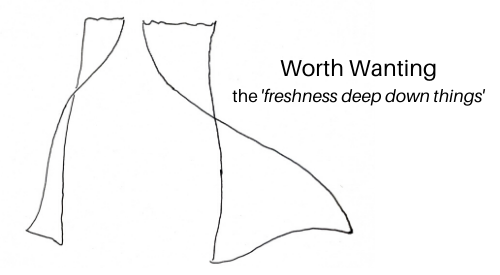
Encounters are confrontations. The other confronts our presumptions about what’s next and our assumptions about what’s the case, that self-ratifying system of habits of behavior and belief, part personal, part public, that characterizes our inattentive efficiency. In an encounter, the alitorium of the other, that global environment of others and othernesses the other lives in, presents itself to us in ways that presses, tugs, infects and disinfects, awakens and suppresses parts of our alitorium. Perhaps we respond with change, perhaps with renewed resistance to change, but the confrontation occurs and, subtly or dramatically, reluctantly or readily, our alitorium changes.
We can think about our system of habits of behavior and belief in terms of our pep, the powers we exert, the energies we expend, the potentialities we exploit, in terms of observable influences, exertions or actions which can serve as clues about our alitorium. It’s through observation of someone or something’s pep that we get a sense of its alitorium and the alitorium’s alterations. More pep here.
So, for instance, when we see someone or something exerting power by discouraging, suppressing or penalizing, we can make inferences about a whole section of their alitorium related to the norms guiding their important others, and themselves.
So let’s say someone explains that they won’t wear a face mask at a party because the social norms of the group would think it ‘inappropriate’. We can infer something about the alitorium of that person related to other party goers and the power of their looks and laughs.
Or, if we see someone or something struggling, striving, stressed, teetering, we can make inferences about the part of their alitorium related to forces at work and constraints in place in their environment.
Let’s say we see someone struggling to make student loan debt payments while faced with high prescription prices (painfully, too common). Clearly the alitorium of that person gives prominent place to the particular others exhibiting the forces of physical need (the body) and the constraints of legal obligation (the lender).
Or, if we see someone or something responding to the latent possibility, not yet the actuality, of something else experiencing shifts in its equilibrium or internal distribution, we can make inferences about the part of their alitorium that’s about the calculation of capabilities of others and their component parts.
So let’s say someone has lived by a doctrine of making sure none of their relevant peers is significantly more influential overall than the other others. An example might be British foreign policy vis a vis continental Europe in the nineteenth century, for instance. But if there’s a suspicion that one peer is capable of expanding its influence in a way that might threaten that balance of power, action might be taken, perhaps to contain, perhaps to challenge, itself based on an assessment of what others, and we ourselves, can, may and will actually do.
The ultimate, but much more equivocal, inferences we can make based on pep observations are to motives or agendas, the whys of our actions.
Our pep then is a way to compare our before and after encounter selves. Not all changes are dramatic, not all changes are sudden, not all changes are massive, but there will be some eventually discernible change, and reflection on our encounters is likely to reveal it.
